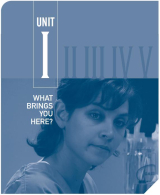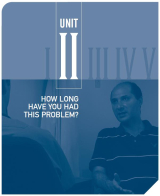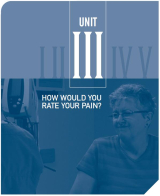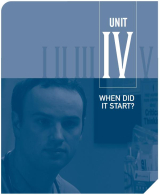
Oups, this website is outdated! But Dialogue McGill has a new website!
The self-study workbook and accompanying audio and video documents present a variety of scenarios based on typical situations involving triage nurses and clients. Language learners who view the videos, listen to the audio exercises and complete the workbook exercises will learn to use appropriate English terms in order to do the following:

Functions |
- Making an initial assessment of the medical problem - Asking follow-up questions - Putting patients at ease - Practising, listening to, reading and asking questions using vocabulary related to injury, earache, common cold and thrombosis |
Listening |
- To a dialogue for general comprehension and details - To typical questions a triage nurse asks - To short interactions between the patient and the nurse - To and pronouncing words ending in "s" and "es" - To and pronouncing two-part verbs, an ER visit and typical triage questions |
Vocabulary |
- Two-part verbs - Sport injuries - Pain - Earache problems - Thrombosis - Vital signs - Common cold |
Grammar |
- Basic questions with "to be" - "Wh" questions using "do" and "does" - Simple present, present continuous - Distinctions between tenses - Possessive forms |
Cultural Notes |
- Putting patients at ease |
Communication Strategies and Tactics |

Functions |
- Taking a brief history of the medical problem - Understanding how long the problem has been going on - Reflecting on the basic questioning process - Formulating basic triage questions for breastfeeding, dizziness, headache and head trauma - Practising, listening to, reading and asking questions using vocabulary relqted to breasfeeding, dizziness, migraine, head injury and body parts |
Listening |
- To a dialogue for general comprehension and details - To and pronouncing titles and breasfeeding vocabulary - To and pronouncing words ending in "ed" |
Vocabulary |
- Breasfeeding problems - Dizziness problems - Headaches problems - Eye injuries - Medical specialists - Body parts and the five senses |
Grammar |
- "Wh" questions using "did" - Time expressions - Simple past, present prfect and present perfect continuous tenses - Distinctions among tenses |
Cultural Notes |
- Using titles - Talking about the body |
Communication Strategies and Tactics |
- Hypothesis testing for a clearer understanding |

Functions |
- Focusing on how patients describe their symptoms - Soliciting information from patients in relation to symptoms - Practising, listening to, reading and asking questions using vocabulary for pain and its degrees of intensity - formulating basic triage questions for respiratory and infectious disease problems - Using slang and euphemistic terminology to describe symptoms - Asking for clarification - Making suggestions and giving instructions |
Listening |
- To a dialogue for general comprehension and details - To sample questions - To short interactions between the patient - To a reading of a case history describing pneumonia - To the pronunciation of words of pain and their related degrees of intensity - to and pronouncing minimal pairs |
Vocabulary |
- Pain - abdominal and respiratory - Degrees of pain - Respiratory problems - Abdominal problems - Gastro - Tuberculosis - Pneumonia - Slang terms - Euphemisms - Idioms - Disabilities - Politically correct terminology - False cognates - Vulgar terms to avoid - Acronyms and abbreviations |
Grammar |
- "Wh" questions in all tenses - Conditional sentences - Modal auxiliairies, present and future - Comparative and superlative adjectives |
Cultural Notes |
- Using nice words and professional words - Avoiding bad words - Using words with dignity |
Communication Strategies and Tactics |
- Asking for clarifications - Making suggestions - Giving instructions - Understanding degrees of obligation |

Functions |
- Formulating triage questions for dermatological, endocrine and psychosocial problems - Identifying types of triage questions - Practising, listening to, reading, speaking, and asking questions using vocabulary and idioms related to dermatological, endocrine, psychosocial and emotional problems - Making subjective and objective observations |
Listening |
- To a dialogue for general comprehension and details - To sample questions - To the pronunciation of dermatological, endocrine, emotional and idiomatic vocabularies - To, repeating and playing the nurse's role - To and pronouncing "ch" words |
Vocabulary |
- Skin conditions - Endocrine problems - Psychosocial problems - Emotional words - Idioms that express psychological distress |
Grammar |
- Distinction between simple past and past continuous tenses - Past tenses and time clauses |
Cultural Notes |
- Accomodating diversities |
Communication Strategies and Tactics |

Functions |
- Looking at what to say in the final stages of triage - Identifying and expressing empathy - Reviewing questioning protocols related to suicide - Analyzing nurse-patient interaction in sensitive situations - Responding to emotional patients - Closing triage conversation with patients |
Listening |
- To a dialogue for general comprehension and details - To sample questions - to identify specific phrases of empathy - To fill in longer stretches of discourse - To several ways to end a conversation - To and practising word stress |
Vocabulary |
- Negative emotions - Idioms including "teen speak" - Illnesses such as STIs, genitourinary infections, abnormal uterine bleeding, depression and suicide, myocardial infarction - Medical terms - Hospital departments |
Grammar |
- Modal "can" - Future forms - Imperatives |
Cultural Notes |
- Teen speak |
Communication Strategies and Tactics |
- Ending conversation with verbal and non-verbal cues |
Grammar at a Glance: Present Tenses Chart 1 [.pdf]
Practice With "Do" or "Does" Questions [.pdf]
Grammar Tips - "Wh" Questions: Forms and Meaning [.pdf]
![]() 2_an_earache.m4v
2_an_earache.m4v
Video - An Earache
An Earache [.pdf]
Cultural Note: Putting Patients at Ease [.pdf]
Crossword [.pdf]
![]() 2_stis.m4v
2_stis.m4v
Video - STIs
STIs [.pdf]
Coming soon: Complementary exercises related to each unit.